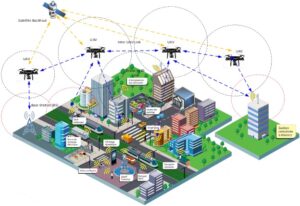SI in MDPI Electronics on Vehicular Communications
SI in Wiley ETTT Journal on Internet of Connected Vehicles
SI in MDPI Applied Sciences on Soft Computing and Applications

Powering Innovation with Industries
I am collaborating with a number of companies and universities for empowering innovation via academic research expertise. Some of our current partners in innovation projects include Franklin Energy (https://franklinenergy.co.uk/) Clean Car (https://cleancar.io/) JMVL (https://www.jmvl.co.uk/), University College London, Newcastle University, Kings College London, University of York, University of Nottingham, Loughborough University, Lancaster University, and the University of Surrey.
1. Drive with Confidence: A Safe and Secure Driving System to Mitigate Remote Vehicle Hijacking Risks
This is an Innovate UK funded project. The increasing advancements in vehicles in terms of Vehicle-to-Vehicle (V2V), Vehicle-to-Infrastructure (V2I), and In-Vehicle Communications have transformed today’s vehicles into more than just a transportation medium. With 85% of new cars in the UK being connected vehicles and projected to reach 100% by 2026, these vehicles produce up to 25GB of driving data every hour, according to an EU report. Although these advancements have improved driving safety and optimized travel costs, the risk of remote vehicle hijacking has also increased. The number of reported cyberattacks on connected vehicles has significantly increased in recent years, highlighting the need for improved cybersecurity measures for connected vehicles. Towards this end, the “Drive with Confidence” project at Nottingham Trent University aims to develop “a safe and secure driving system to mitigate remote vehicle hijacking risks”. This will help prevent unauthorized access to steering wheels, disabling brakes, locking doors, engine disruption, path forging, location and identity manipulation, denial of traffic service, and vehicle tracking. In summary, the ” Drive with Confidence ” project addresses the growing concern of cyber security threats in connected vehicles by developing a secure driving system:
ONLINE Survey: Drive with Confidence, Innovate UK
- Nottingham Trent University
- Innovate UK
- Aurrigo (Industry Collaborator)
- JMVL Ltd (Industry Collaborator)
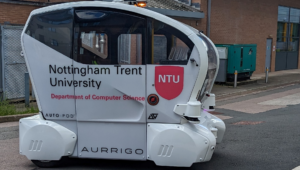
2. LiNET: Visible Light Secure Networking for Connected and Autonomous Vehicles
The project is a REF Quality Research (QR) funding of NTU where a full-time Postdoctoral Research Fellow is recruited. Light-emitting diodes commonly called LEDs have been widely used in today’s vehicles and roadside infrastructures such as headlights, taillights, streetlights, and traffic lights. The wide usage of Light emitting diodes has enabled visible light communication (VLC) as a potential technology for enabling CAV. VLC is significant in scarce radio frequency scenarios such as congested and connected traffic environment where wireless communication becomes impractical due to the unavailability of radio frequency channels. In this context, LiNET project is targeting to innovate visible light communication-enabled networking framework for enabling CAV traffic environments. Building on our existing research on connected vehicles, this team will focus on developing a secure visible light communication framework for enabling CAV. The project includes the following major partners:
- Nottingham Trent University
- University of Oxford
- Cleancar (Industry Collaborator)

3. E-Mobility: Cyber Security for Smart EV Charging Network
The project is an industry-funded project where a Ph.D. student is recruited for 3 years with a fully funded scholarship. The core objective of the E-Mobility Cyber Security project is to foster NTU-Industry research collaboration toward EV-centric smart, secure, and green mobility. The expertise-centric research collaboration consists of three working groups including vehicular communication for EV charging management, cyber security of charging infrastructure, and data analytics for cyber risk prediction. (see below Figure). Specifically, a connected EV-centric secure charging framework will be developed for EV charging infrastructure management focusing on traffic dynamics. The three interdisciplinary research themes will bring innovative ideas and new knowledge concerning the mass market penetration of EVs in the near future and the associated risks involved. The project includes the following major partners:
- Nottingham Trent University
- JMVL Ltd (Industry Collaborator)
- RAW Charing (Industry Collaborator)
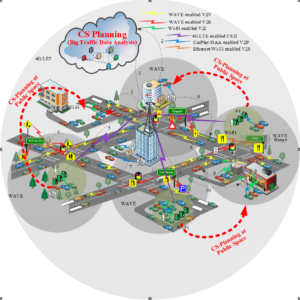
4. STEM-Secure and Trustworthy Environment Monitoring using IoT
This is another recent industry-funded project where a Ph.D. student is being recruited for 3 years with a fully funded scholarship. The project’s aim is to develop an air quality monitoring device that can be utilized indoors as well as outdoors. The intention is to make a battery-efficient air quality monitoring device that can be used as a stationary device and has the flexibility of mounting it on air or land-based drones/vehicles. This device’s design and development will be carried out by utilizing the research expertise of NTU academics together with the product designing and development expertise of Cobac Security. The following partners are collaborating on the project:
- Nottingham Trent University
- Cardiff University
- Cobac Security, Nottingham (Industry Collaborator)
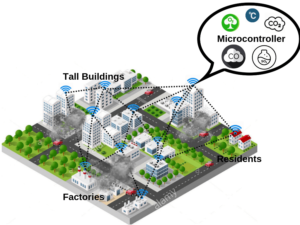
5. Software-Defined Drone Traffic Management System and Nano Drones
This is a Knowledge Transfer Partnership (KTP) project under development targeting to empower research and development activities in drones centric business opportunities. The project will develop a software platform for effectively managing non-conflicting travel paths for a group of drones in any predefined 3D volume of the sky (see Figure). The project includes the following major partners:
- JMVL Ltd (Industry Collaborator)
- Nottingham Trent University
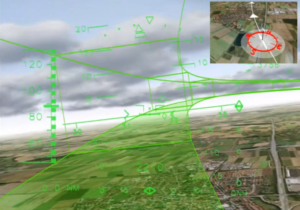
6. DroNET-Cyber Security for Next-Genration Drone Networking
This is the ECR Fund of the Department of Computer Science, NTU where an RA has been recruited to work on the project. DroNET is targeting to innovate novel security techniques for connected drone communication for enabling range of next-generation drone use cases to realize securely connected and autonomous drones. A technology resource team will be built up in the department utilizing the drone-centric communication networking, robotics, and security expertise at NTU. For product design and development-centric expertise, we are involving a security product-related industry partner in the research team. The resource team will build a product prototype for secure drone communication. Drone product-centric various case studies will be performed in the DroNET at NTU to validate the applicability and performance of the secure drone use cases. The aim of DroNET project is to design and develop secure drone communication for a range next generation connected drone services.. The project includes the following major partners:
- Nottingham Trent University
- University College London
- IONOS (Industry Collaborator)
